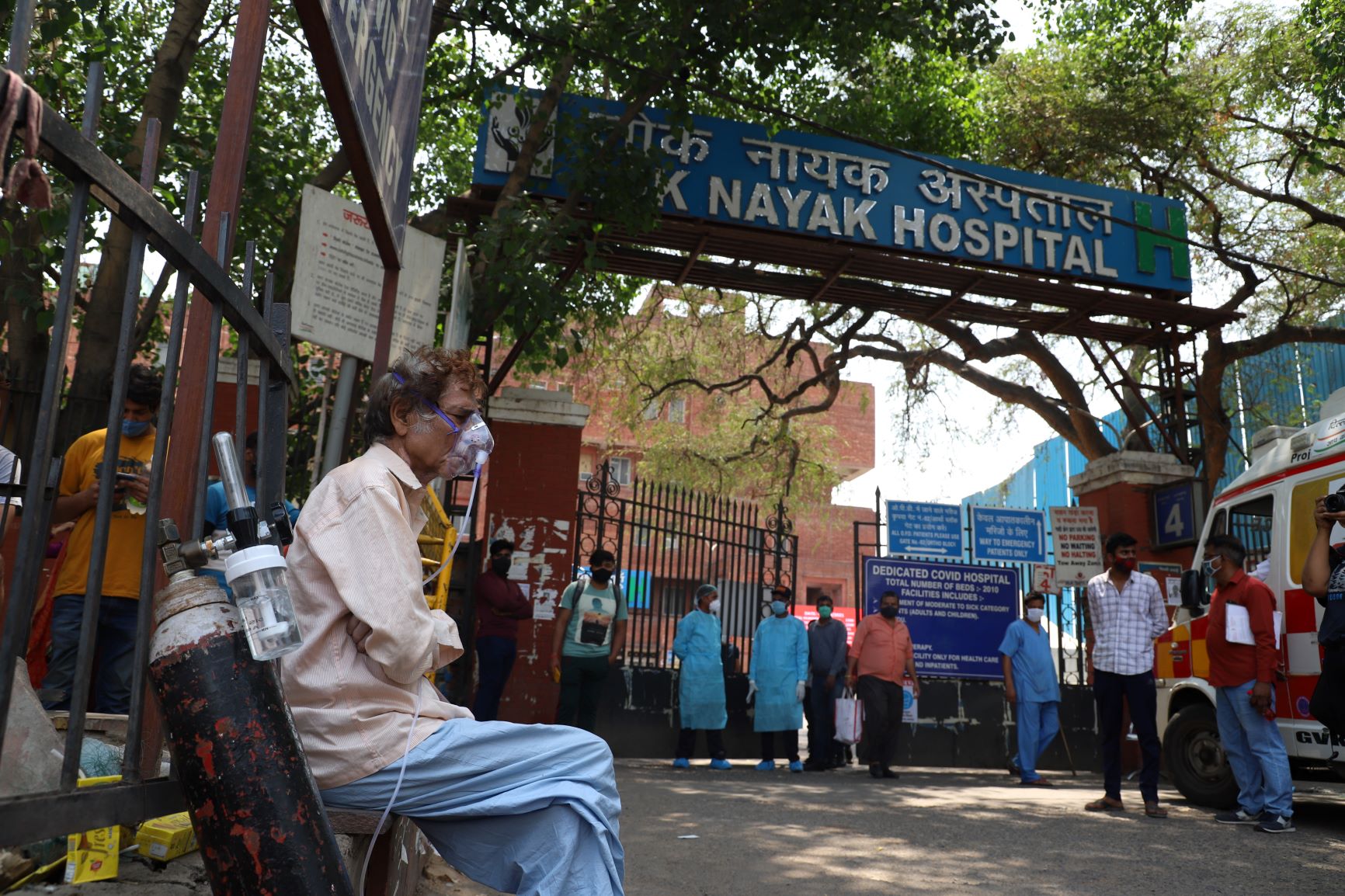Profiteering in pandemic panic

Something as basic as oxygen for hospitals has become a rare commodity leading to the best and biggest of hospitals in India beg for urgent supplies (MIG photos/Aman Kanojiya)
The gory images and heart rending stories coming from all across India over the past few weeks about the second wave of coronavirus pandemic that is sweeping across the country have perhaps done more to convince even the most sceptical Indians to start looking for Covid-19 vaccines.
Social media networks as well as some of the mainstream media have been running stories about the panic that has gripped India in the midst of a seemingly unstoppable surge of the second wave, with images of bodies of Covid-19 victims lined up inside and outside crematoriums that are unable to cope with the number of bodies despite working round the clock and as a result bodies being burnt outside on the streets or just about any other open space for the want of space.
On the other hand, something as basic as oxygen for hospitals has become a rare commodity leading to the best and biggest of the hospitals in the country beg for urgent supplies. Every day, news reports emerge from all over the country of dozens of patients dying for the want of oxygen and people fighting with each other to get hold of an oxygen cylinder for their family members at any price.
These developments, along with a slowdown in the much-touted but falsely claimed “world’s largest vaccination drive” that India is supposedly carrying out, have led to a spike in demand for the vaccines, not just in the elder population and those with co-morbidities, but also among the younger population, in the 18 to 44 age group as scores of youth succumb to the new variant of the virus that has gripped India.

Serum Institute, which sold to Indian government at INR 150 a dose, has priced the vaccine at INR 400 for state governments and INR 600 for private hospitals (MIG photos/Aman Kanojiya)
Vaccine makers profiteer as Centre looks on
There are several problems with India’s vaccination programme like a very delayed kick-off, followed by slow pace, that rises only in fits and bouts, leaving India way behind other nations in percentage of population covered. But perhaps the biggest problem with the vaccination drive has been a total lack of transparency and complete mismanagement.
Most countries, notably US and EU, had already placed orders for vaccines as early as May 2020 when the search for vaccines began. These nations booked enough vaccines to inoculate their entire population several times over and got firm and legally-enforceable commitments from vaccine companies getting the orders. In India, all these activities began only towards end of 2020, when most of the early vaccine production had already been committed to other nations. And moreover, the entire exercise has been carried out piecemeal, with the government ordering a few million here and a few million there.
And in this key and life-saving matter, too, the Modi government has continued its behaviour as an administration that has never ever been eager to share data about anything and has manipulated or withheld data that may cast a negative shadow on it. It is a monumental challenge to collate exactly how many vaccines have been ordered with their scheduled delivery dates. The Union budget presented in February this year allocated INR 350 billion for vaccines, which roughly corresponds to about two billion doses at the declared price of about INR 150 that the government will pay.
Despite calls for opening vaccination to all adults at the earliest, Modi has preferred to do at his own pace and at differential pricing, even though practically every country in the world has committed to vaccinate its entire population for free. As the demand for vaccines began rising even among the 18-44 year age group, the Central government, having monopolised the entire process for well over a year, suddenly decided to pass the buck to individual citizens and the state governments and asked them to negotiate prices and source from the manufacturers on their own. At the same time, it cleared sale of vaccines made in other nations, notably Pfizer, Moderna and Sputnik. Incidentally, it had been sitting on these applications for several months, even as the country faced shortages of vaccines.
Both the vaccine makers in India took their cue from the Centre’s pronouncement and suddenly announced eye-gouging rates for their vaccines for the states. For instance, Serum Institute, which sold to Indian government at INR 150 a dose, has priced the vaccine at INR 400 for state governments and INR 600 for private hospitals. At these prices, Serum is charging Indian citizens the highest price in the world for these. For instance, it sells at INR 388 to South Africa and Saudi Arabia, INR 300 to United States and Bangladesh, a mere INR 233 to Brazil, INR 222 to the United Kingdom and as low as INR 159 to many European Union nations.
In face of sharp criticism of the blatant profiteering by Serum Institute, CEO Adar Poonawalla, issued a lame clarification, saying the other countries had placed bulk orders and before the manufacturing began. But he perhaps forgot his statements from last year when he had said that even at INR 150 SII was making a profit. Thus, selling the same product at four times a profitable price is nothing but open profiteering.
A day after SII prices were announced, Bharat Biotech released its own prices as well, selling a single dose at INR 600 to state governments and an eye-watering INR 1200 for private hospitals. These prices, as high as 8 times the price at which the vaccine is being sold to the Centre, and are no different to export prices. It appears that the two manufacturers had received the cue to charge these sky high prices from the Central government as is evident from a statement by Dr Krishna Ella, managing director, of Bharat Biotech while announcing the prices for the common Indian citizens. “Following the Govt of India directives, we announce the prices of COVAXIN vaccines INR 600 per dose for state hospitals and INR 1,200 per dose for private hospitals,” Bharat Biotech said.
It is important to note that the prices to be paid by the people when they go to private hospitals for vaccinations could be much higher as it is unclear whether these are retail prices and if they include logistical charges like transport and storage. And of course, anyone with a first-hand experience of private hospitals in India would know that the hospitals themselves charge a hefty add on to any medicine. It is hardly likely that they will be any generous this time around.









